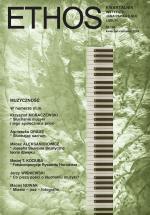 zobacz powiększenie | DOI 10.12887/32-2019-2-126-08 Agnieszka DRAUS – Listening to Sacred Music: On Experiencing Spirituality in the Music of the 20th and 21st Centuries. Reconnaissance, Selection, Interpretation. Cena brutto: 7,00 PLN za szt. |
|
Agnieszka DRAUS – Listening to Sacred Music: On Experiencing Spirituality in the Music of the 20th and 21st Centuries. Reconnaissance, Selection, Interpretation. DOI 10.12887/32-2019-2-126-08 Homo sapiens, the most complex creature on Earth, has developed the ability to experience reality on many levels. The first of them is that of intuitive and sensual knowledge of the world on the one hand and of research and intellectual approach on the other. The second level of human experience embraces documenting cognitive results by means of scientific and reflective description of the world, but also by way of artistic expression. Finally, there is the level of experiencing the world of everyday life as opposed to its festive dimension, the life of a human individual being stretched between these polarities, between “the two ways of being-in-the-world”: the secular one and the one related to the sacred. The aim of this article is to present a set of qualities, universal as well as individual, unambiguous as well as ambiguous, that mark the presence of the sacred in the 20th- and 21st-centuries music. The author discusses masterpieces of Polish music by such classics as Krzysztof Penderecki, Henryk Mikołaj Górecki, and Wojciech Kilar, as well as by younger authors, namely, Paweł Łukaszewski and Paweł Mykietyn. Apart from religious works, the author discusses those considered as aesthetically controversial or demonstrating religious syncretism and manifesting the faith of their creators in a broadly understood inner spiritual sphere rather than in the perspective of one of the institutionalized religions. Thus the author points to a continuous significance of Eliade’s homo religiosus, “who believes that life has sacral origins and that the existence of man fulfills all the possibilities inherent in him to the extent that it is religious, i.e. that it participates in the only reality.” It is not only about, as Krzysztof Penderecki wanted, “a rebuilding of the metaphysical space of man,” but also about its constant development and expansion in the context of the changing times, trends, ways of communication, and functioning of societies. Translated by Aneta Ptak Keywords: the sacred, modern music, contemporary music, holiness and secularity, religious motifs, religious syncretism, homo religiosus Contact: Katedra Teorii i Interpretacji Dzieła Muzycznego, Instytut Kompozycji, Dyrygentury i Teorii Muzyki, Wydział Twórczości, Interpretacji i Edukacji Muzycznej, Akademia Muzyczna, ul. św. Tomasza 43, 31-027 Cracow, Poland Pliki do pobrania: » Draus.pdf | |
